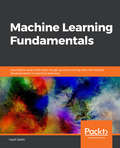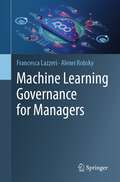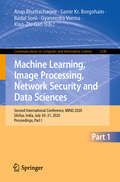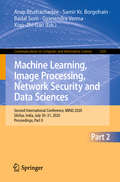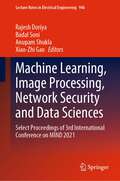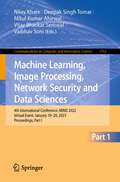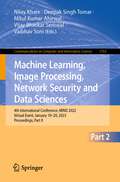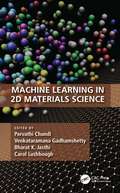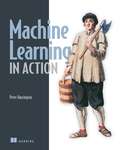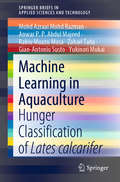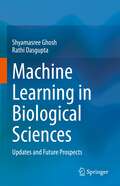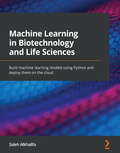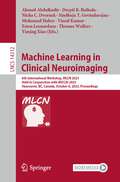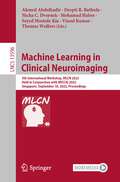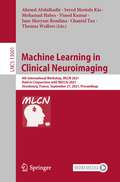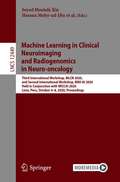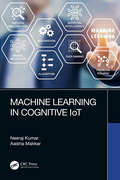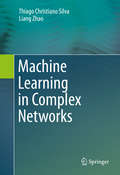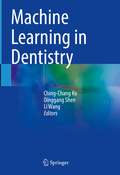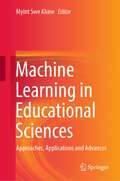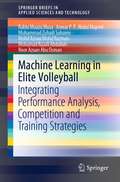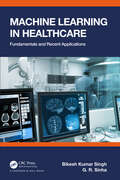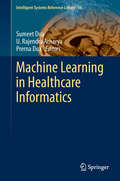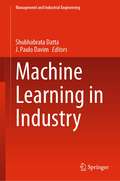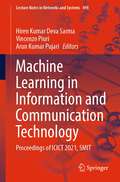- Table View
- List View
Machine Learning Fundamentals
by Hyatt SalehMachine Learning Fundamentals is designed for developers who are new to the field of machine learning and want to learn how to use the scikit-learn library to develop machine learning algorithms. You must have some knowledge and experience in Python programming, but you do not need any prior knowledge of scikit-learn or machine learning algorithms.
Machine Learning Governance for Managers
by Francesca Lazzeri Alexei RobskyMachine Learning Governance for Managers provides readers with the knowledge to unlock insights from data and leverage AI solutions. In today's business landscape, most organizations face challenges in scaling and maintaining a sustainable machine learning model lifecycle. This book offers a comprehensive framework that covers business requirements, data generation and acquisition, modeling, model deployment, performance measurement, and management, providing a range of methodologies, technologies, and resources to assist data science managers in adopting data and AI-driven practices. Particular emphasis is given to ramping up a solution quickly, detailing skills and techniques to ensure the right things are measured and acted upon for reliable results and high performance. Readers will learn sustainable tools for implementing machine learning with existing IT and privacy policies, including versioning all models, creating documentation, monitoring models and their results, and assessing their causal business impact. By overcoming these challenges, bottom-line gains from AI investments can be realized. Organizations that implement all aspects of AI/ML model governance can achieve a high level of control and visibility over how models perform in production, leading to improved operational efficiency and a higher ROI on AI investments. Machine Learning Governance for Managers helps to effectively control model inputs and understand all the variables that may impact your results. Don't let challenges in machine learning hinder your organization's growth - unlock its potential with this essential guide.
Machine Learning, Image Processing, Network Security and Data Sciences: Second International Conference, MIND 2020, Silchar, India, July 30 - 31, 2020, Proceedings, Part I (Communications in Computer and Information Science #1240)
by Arup Bhattacharjee Samir Kr. Borgohain Badal Soni Gyanendra Verma Xiao-Zhi GaoThis two-volume set (CCIS 1240-1241) constitutes the refereed proceedings of the Second International Conference on Machine Learning, Image Processing, Network Security and Data Sciences, MIND 2020, held in Silchar, India. Due to the COVID-19 pandemic the conference has been postponed to July 2020. The 79 full papers and 4 short papers were thoroughly reviewed and selected from 219 submissions. The papers are organized according to the following topical sections: data science and big data; image processing and computer vision; machine learning and computational intelligence; network and cyber security.
Machine Learning, Image Processing, Network Security and Data Sciences: Second International Conference, MIND 2020, Silchar, India, July 30 - 31, 2020, Proceedings, Part II (Communications in Computer and Information Science #1241)
by Arup Bhattacharjee Samir Kr. Borgohain Badal Soni Gyanendra Verma Xiao-Zhi GaoThis two-volume set (CCIS 1240-1241) constitutes the refereed proceedings of the Second International Conference on Machine Learning, Image Processing, Network Security and Data Sciences, MIND 2020, held in Silchar, India. Due to the COVID-19 pandemic the conference has been postponed to July 2020. The 79 full papers and 4 short papers were thoroughly reviewed and selected from 219 submissions. The papers are organized according to the following topical sections: data science and big data; image processing and computer vision; machine learning and computational intelligence; network and cyber security.
Machine Learning, Image Processing, Network Security and Data Sciences: Select Proceedings of 3rd International Conference on MIND 2021 (Lecture Notes in Electrical Engineering #946)
by Rajesh Doriya Badal Soni Anupam Shukla Xiao-Zhi GaoThis book constitutes the refereed proceedings of the Third International Conference on Machine Learning, Image Processing, Network Security and Data Sciences, MIND 2021. The papers are organized according to the following topical sections: data science and big data; image processing and computer vision; machine learning and computational intelligence; network and cybersecurity. This book aims to develop an understanding of image processing, networks, and data modeling by using various machine learning algorithms for a wide range of real-world applications. In addition to providing basic principles of data processing, this book teaches standard models and algorithms for data and image analysis.
Machine Learning, Image Processing, Network Security and Data Sciences: 4th International Conference, MIND 2022, Virtual Event, January 19–20, 2023, Proceedings, Part I (Communications in Computer and Information Science #1762)
by Nilay Khare Deepak Singh Tomar Mitul Kumar Ahirwal Vijay Bhaskar Semwal Vaibhav SoniThis two-volume set (CCIS 1762-1763) constitutes the refereed proceedings of the 4th International Conference on Machine Learning, Image Processing, Network Security and Data Sciences, MIND 2022, held in Bhopal, India, in December 2022. The 64 papers presented in this two-volume set were thoroughly reviewed and selected from 399 submissions. The papers are organized according to the following topical sections: machine learning and computational intelligence; data sciences; image processing and computer vision; network and cyber security.
Machine Learning, Image Processing, Network Security and Data Sciences: 4th International Conference, MIND 2022, Virtual Event, January 19–20, 2023, Proceedings, Part II (Communications in Computer and Information Science #1763)
by Nilay Khare Deepak Singh Tomar Mitul Kumar Ahirwal Vijay Bhaskar Semwal Vaibhav SoniThis two-volume set (CCIS 1762-1763) constitutes the refereed proceedings of the 4th International Conference on Machine Learning, Image Processing, Network Security and Data Sciences, MIND 2022, held in Bhopal, India, in December 2022. The 64 papers presented in this two-volume set were thoroughly reviewed and selected from 399 submissions. The papers are organized according to the following topical sections: machine learning and computational intelligence; data sciences; image processing and computer vision; network and cyber security.
Machine Learning in 2D Materials Science
by Parvathi ChundiData science and machine learning (ML) methods are increasingly being used to transform the way research is being conducted in materials science to enable new discoveries and design new materials. For any materials science researcher or student, it may be daunting to figure out if ML techniques are useful for them or, if so, which ones are applicable in their individual contexts, and how to study the effectiveness of these methods systematically. KEY FEATURES • Provides broad coverage of data science and ML fundamentals to materials science researchers so that they can confidently leverage these techniques in their research projects. • Offers introductory material in topics such as ML, data integration, and 2D materials. • Provides in-depth coverage of current ML methods for validating 2D materials using both experimental and simulation data, researching and discovering new 2D materials, and enhancing ML methods with physical properties of materials. • Discusses customized ML methods for 2D materials data and applications and high-throughput data acquisition. • Describes several case studies illustrating how ML approaches are currently leading innovations in the discovery, development, manufacturing, and deployment of 2D materials needed for strengthening industrial products. • Gives future trends in ML for 2D materials, explainable AI, and dealing with extremely large and small, diverse datasets. Aimed at materials science researchers, this book allows readers to quickly, yet thoroughly, learn the ML and AI concepts needed to ascertain the applicability of ML methods in their research.
Machine Learning in Action
by Peter HarringtonSummaryMachine Learning in Action is unique book that blends the foundational theories of machine learning with the practical realities of building tools for everyday data analysis. You'll use the flexible Python programming language to build programs that implement algorithms for data classification, forecasting, recommendations, and higher-level features like summarization and simplification.About the BookA machine is said to learn when its performance improves with experience. Learning requires algorithms and programs that capture data and ferret out the interestingor useful patterns. Once the specialized domain of analysts and mathematicians, machine learning is becoming a skill needed by many.Machine Learning in Action is a clearly written tutorial for developers. It avoids academic language and takes you straight to the techniques you'll use in your day-to-day work. Many (Python) examples present the core algorithms of statistical data processing, data analysis, and data visualization in code you can reuse. You'll understand the concepts and how they fit in with tactical tasks like classification, forecasting, recommendations, and higher-level features like summarization and simplification.Readers need no prior experience with machine learning or statistical processing. Familiarity with Python is helpful. Purchase of the print book comes with an offer of a free PDF, ePub, and Kindle eBook from Manning. Also available is all code from the book. What's InsideA no-nonsense introductionExamples showing common ML tasksEveryday data analysisImplementing classic algorithms like Apriori and AdaboosTable of ContentsPART 1 CLASSIFICATIONMachine learning basicsClassifying with k-Nearest NeighborsSplitting datasets one feature at a time: decision treesClassifying with probability theory: naïve BayesLogistic regressionSupport vector machinesImproving classification with the AdaBoost meta algorithmPART 2 FORECASTING NUMERIC VALUES WITH REGRESSIONPredicting numeric values: regressionTree-based regressionPART 3 UNSUPERVISED LEARNINGGrouping unlabeled items using k-means clusteringAssociation analysis with the Apriori algorithmEfficiently finding frequent itemsets with FP-growthPART 4 ADDITIONAL TOOLSUsing principal component analysis to simplify dataSimplifying data with the singular value decompositionBig data and MapReduce
Machine Learning in Aquaculture: Hunger Classification of Lates calcarifer (SpringerBriefs in Applied Sciences and Technology)
by Zahari Taha Gian-Antonio Susto Yukinori Mukai Mohd Azraai Mohd Razman Anwar P. P. Abdul Majeed Rabiu Muazu MusaThis book highlights the fundamental association between aquaculture and engineering in classifying fish hunger behaviour by means of machine learning techniques. Understanding the underlying factors that affect fish growth is essential, since they have implications for higher productivity in fish farms. Computer vision and machine learning techniques make it possible to quantify the subjective perception of hunger behaviour and so allow food to be provided as necessary. The book analyses the conceptual framework of motion tracking, feeding schedule and prediction classifiers in order to classify the hunger state, and proposes a system comprising an automated feeder system, image-processing module, as well as machine learning classifiers. Furthermore, the system substitutes conventional, complex modelling techniques with a robust, artificial intelligence approach. The findings presented are of interest to researchers, fish farmers, and aquaculture technologist wanting to gain insights into the productivity of fish and fish behaviour.
Machine Learning in Biological Sciences: Updates and Future Prospects
by Shyamasree Ghosh Rathi DasguptaThis book gives an overview of applications of Machine Learning (ML) in diverse fields of biological sciences, including healthcare, animal sciences, agriculture, and plant sciences. Machine learning has major applications in process modelling, computer vision, signal processing, speech recognition, and language understanding and processing and life, and health sciences. It is increasingly used in understanding DNA patterns and in precision medicine. This book is divided into eight major sections, each containing chapters that describe the application of ML in a certain field. The book begins by giving an introduction to ML and the various ML methods. It then covers interesting and timely aspects such as applications in genetics, cell biology, the study of plant-pathogen interactions, and animal behavior. The book discusses computational methods for toxicity prediction of environmental chemicals and drugs, which forms a major domain of research in the field of biology. It is of relevance to post-graduate students and researchers interested in exploring the interdisciplinary areas of use of machine learning and deep learning in life sciences.
Machine Learning in Biotechnology and Life Sciences: Build machine learning models using Python and deploy them on the cloud
by Saleh AlkhalifaExplore all the tools and templates needed for data scientists to drive success in their biotechnology careers with this comprehensive guideKey FeaturesLearn the applications of machine learning in biotechnology and life science sectorsDiscover exciting real-world applications of deep learning and natural language processingUnderstand the general process of deploying models to cloud platforms such as AWS and GCPBook DescriptionThe booming fields of biotechnology and life sciences have seen drastic changes over the last few years. With competition growing in every corner, companies around the globe are looking to data-driven methods such as machine learning to optimize processes and reduce costs. This book helps lab scientists, engineers, and managers to develop a data scientist's mindset by taking a hands-on approach to learning about the applications of machine learning to increase productivity and efficiency in no time.You'll start with a crash course in Python, SQL, and data science to develop and tune sophisticated models from scratch to automate processes and make predictions in the biotechnology and life sciences domain. As you advance, the book covers a number of advanced techniques in machine learning, deep learning, and natural language processing using real-world data.By the end of this machine learning book, you'll be able to build and deploy your own machine learning models to automate processes and make predictions using AWS and GCP.What you will learnGet started with Python programming and Structured Query Language (SQL)Develop a machine learning predictive model from scratch using PythonFine-tune deep learning models to optimize their performance for various tasksFind out how to deploy, evaluate, and monitor a model in the cloudUnderstand how to apply advanced techniques to real-world dataDiscover how to use key deep learning methods such as LSTMs and transformersWho this book is forThis book is for data scientists and scientific professionals looking to transcend to the biotechnology domain. Scientific professionals who are already established within the pharmaceutical and biotechnology sectors will find this book useful. A basic understanding of Python programming and beginner-level background in data science conjunction is needed to get the most out of this book.
Machine Learning in Clinical Neuroimaging: 6th International Workshop, MLCN 2023, Held in Conjunction with MICCAI 2023, Vancouver, BC, Canada, October 8, 2023, Proceedings (Lecture Notes in Computer Science #14312)
by Ahmed Abdulkadir Deepti R. Bathula Nicha C. Dvornek Sindhuja T. Govindarajan Mohamad Habes Vinod Kumar Esten Leonardsen Thomas Wolfers Yiming XiaoThis book constitutes the refereed proceedings of the 6th International Workshop on Machine Learning in Clinical Neuroimaging, MLCN 2023, held in Conjunction with MICCAI 2023 in Vancouver, Canada, in October 2023. The book includes 16 papers which were carefully reviewed and selected from 28 full-length submissions.The 6th International Workshop on Machine Learning in Clinical Neuroimaging (MLCN 2023) aims to bring together the top researchers in both machine learning and clinical neuroscience as well as tech-savvy clinicians to address two main challenges: 1) development of methodological approaches for analyzing complex and heterogeneous neuroimaging data (machine learning track); and 2) filling the translational gap in applying existing machine learning methods in clinical practices (clinical neuroimaging track).The papers are categorzied into topical sub-headings on Machine Learning and Clinical Applications.
Machine Learning in Clinical Neuroimaging: 5th International Workshop, MLCN 2022, Held in Conjunction with MICCAI 2022, Singapore, September 18, 2022, Proceedings (Lecture Notes in Computer Science #13596)
by Ahmed Abdulkadir Deepti R. Bathula Nicha C. Dvornek Mohamad Habes Seyed Mostafa Kia Vinod Kumar Thomas WolfersThis book constitutes the refereed proceedings of the 5th International Workshop on Machine Learning in Clinical Neuroimaging, MLCN 2022, held in Conjunction with MICCAI 2022, Singapore in September 2022. The book includes 17 papers which were carefully reviewed and selected from 23 full-length submissions.The 5th international workshop on Machine Learning in Clinical Neuroimaging (MLCN2022) aims to bring together the top researchers in both machine learning and clinical neuroscience as well as tech-savvy clinicians to address two main challenges: 1) development of methodological approaches for analyzing complex and heterogeneous neuroimaging data (machine learning track); and 2) filling the translational gap in applying existing machine learning methods in clinical practices (clinical neuroimaging track).The papers are categorzied into topical sub-headings: Morphometry; Diagnostics, and Aging, and Neurodegeneration.
Machine Learning in Clinical Neuroimaging: 4th International Workshop, MLCN 2021, Held in Conjunction with MICCAI 2021, Strasbourg, France, September 27, 2021, Proceedings (Lecture Notes in Computer Science #13001)
by Ahmed Abdulkadir Seyed Mostafa Kia Mohamad Habes Vinod Kumar Jane Maryam Rondina Chantal Tax Thomas WolfersThis book constitutes the refereed proceedings of the 4th International Workshop on Machine Learning in Clinical Neuroimaging, MLCN 2021, held on September 27, 2021, in conjunction with MICCAI 2021. The workshop was held virtually due to the COVID-19 pandemic. The 17 papers presented in this book were carefully reviewed and selected from 27 submissions. They were organized in topical sections named: computational anatomy and brain networks and time series.
Machine Learning in Clinical Neuroimaging and Radiogenomics in Neuro-oncology: Third International Workshop, MLCN 2020, and Second International Workshop, RNO-AI 2020, Held in Conjunction with MICCAI 2020, Lima, Peru, October 4–8, 2020, Proceedings (Lecture Notes in Computer Science #12449)
by Seyed Mostafa Kia Hassan Mohy-ud-Din Ahmed Abdulkadir Cher Bass Mohamad Habes Jane Maryam Rondina Chantal Tax Hongzhi Wang Thomas Wolfers Saima Rathore Madhura IngalhalikarThis book constitutes the refereed proceedings of the Third International Workshop on Machine Learning in Clinical Neuroimaging, MLCN 2020, and the Second International Workshop on Radiogenomics in Neuro-oncology, RNO-AI 2020, held in conjunction with MICCAI 2020, in Lima, Peru, in October 2020.*For MLCN 2020, 18 papers out of 28 submissions were accepted for publication. The accepted papers present novel contributions in both developing new machine learning methods and applications of existing methods to solve challenging problems in clinical neuroimaging. For RNO-AI 2020, all 8 submissions were accepted for publication. They focus on addressing the problems of applying machine learning to large and multi-site clinical neuroimaging datasets. The workshop aimed to bring together experts in both machine learning and clinical neuroimaging to discuss and hopefully bridge the existing challenges of applied machine learning in clinical neuroscience. *The workshops were held virtually due to the COVID-19 pandemic.
Machine Learning in Cognitive IoT
by Neeraj Kumar Aaisha MakkarThis book covers the different technologies of Internet, and machine learning capabilities involved in Cognitive Internet of Things (CIoT). Machine learning is explored by covering all the technical issues and various models used for data analytics during decision making at different steps. It initiates with IoT basics, its history, architecture and applications followed by capabilities of CIoT in real world and description of machine learning (ML) in data mining. Further, it explains various ML techniques and paradigms with different phases of data pre-processing and feature engineering. Each chapter includes sample questions to help understand concepts of ML used in different applications. Explains integration of Machine Learning in IoT for building an efficient decision support system Covers IoT, CIoT, machine learning paradigms and models Includes implementation of machine learning models in R Help the analysts and developers to work efficiently with emerging technologies such as data analytics, data processing, Big Data, Robotics Includes programming codes in Python/Matlab/R alongwith practical examples, questions and multiple choice questions
Machine Learning in Complex Networks
by Thiago Christiano Silva Liang ZhaoThis book presents the features and advantages offered by complex networks in the machine learning domain. In the first part, an overview on complex networks and network-based machine learning is presented, offering necessary background material. In the second part, we describe in details some specific techniques based on complex networks for supervised, non-supervised, and semi-supervised learning. Particularly, a stochastic particle competition technique for both non-supervised and semi-supervised learning using a stochastic nonlinear dynamical system is described in details. Moreover, an analytical analysis is supplied, which enables one to predict the behavior of the proposed technique. In addition, data reliability issues are explored in semi-supervised learning. Such matter has practical importance and is not often found in the literature. With the goal of validating these techniques for solving real problems, simulations on broadly accepted databases are conducted. Still in this book, we present a hybrid supervised classification technique that combines both low and high orders of learning. The low level term can be implemented by any classification technique, while the high level term is realized by the extraction of features of the underlying network constructed from the input data. Thus, the former classifies the test instances by their physical features, while the latter measures the compliance of the test instances with the pattern formation of the data. We show that the high level technique can realize classification according to the semantic meaning of the data. This book intends to combine two widely studied research areas, machine learning and complex networks, which in turn will generate broad interests to scientific community, mainly to computer science and engineering areas.
Machine Learning in Dentistry
by Ching-Chang Ko Dinggang Shen Li WangThis book reviews all aspects of the use of machine learning in contemporary dentistry, clearly explaining its significance for dental imaging, oral diagnosis and treatment, dental designs, and dental research. Machine learning is an emerging field of artificial intelligence research and practice in which computer agents are employed to improve perception, cognition, and action based on their ability to “learn”, for example through use of big data techniques. Its application within dentistry is designed to promote personalized and precision patient care, with enhancement of diagnosis and treatment planning. In this book, readers will find up-to-date information on different machine learning tools and their applicability in various dental specialties. The selected examples amply illustrate the opportunities to employ a machine learning approach within dentistry while also serving to highlight the associated challenges. Machine Learning in Dentistry will be of value for all dental practitioners and researchers who wish to learn more about the potential benefits of using machine learning techniques in their work.
Machine Learning in Educational Sciences: Approaches, Applications and Advances
by Myint Swe KhineThis comprehensive volume investigates the untapped potential of machine learning in educational settings. It examines the profound impact machine learning can have on reshaping educational research. Each chapter delves into specific applications and advancements, sheds light on theory-building, and multidisciplinary research, and identifies areas for further development. It encompasses various topics, such as machine-based learning in psychological assessment. It also highlights the power of machine learning in analyzing large-scale international assessment data and utilizing natural language processing for science education. With contributions from leading scholars in the field, this book provides a comprehensive, evidence-based framework for leveraging machine-learning approaches to enhance educational outcomes. The book offers valuable insights and recommendations that could help shape the future of educational sciences.
Machine Learning in Elite Volleyball: Integrating Performance Analysis, Competition and Training Strategies (SpringerBriefs in Applied Sciences and Technology)
by Rabiu Muazu Musa Anwar P. Abdul Majeed Muhammad Zuhaili Suhaimi Mohd Azraai Mohd Razman Mohamad Razali Abdullah Noor Azuan Abu OsmanThis brief highlights the use of various Machine Learning (ML) algorithms to evaluate training and competitional strategies in Volleyball, as well as to identify high-performance players in the sport. Several psychological elements/strategies coupled with human performance parameters are discussed in view to ascertain their impact on performance in elite Volleyball competitions. It presents key performance indicators as well as human performance parameters that can be used in future evaluation of team performance and players. The details outlined in this brief are vital to coaches, club managers, talent identification experts, performance analysts as well as other important stakeholders in the evaluation of performance and to foster improvement in this sport.
Machine Learning in Healthcare: Fundamentals and Recent Applications
by Bikesh Kumar Singh G.R. SinhaArtificial intelligence (AI) and machine learning (ML) techniques play an important role in our daily lives by enhancing predictions and decision-making for the public in several fields such as financial services, real estate business, consumer goods, social media, etc. Despite several studies that have proved the efficacy of AI/ML tools in providing improved healthcare solutions, it has not gained the trust of health-care practitioners and medical scientists. This is due to poor reporting of the technology, variability in medical data, small datasets, and lack of standard guidelines for application of AI. Therefore, the development of new AI/ML tools for various domains of medicine is an ongoing field of research. Machine Learning in Healthcare: Fundamentals and Recent Applications discusses how to build various ML algorithms and how they can be applied to improve healthcare systems. Healthcare applications of AI are innumerable: medical data analysis, early detection and diagnosis of disease, providing objective-based evidence to reduce human errors, curtailing inter- and intra-observer errors, risk identification and interventions for healthcare management, real-time health monitoring, assisting clinicians and patients for selecting appropriate medications, and evaluating drug responses. Extensive demonstrations and discussion on the various principles of machine learning and its application in healthcare is provided, along with solved examples and exercises. This text is ideal for readers interested in machine learning without any background knowledge and looking to implement machine-learning models for healthcare systems.
Machine Learning in Healthcare Informatics
by Sumeet Dua U. Rajendra Acharya Prerna DuaThe book is a unique effort to represent a variety of techniques designed to represent, enhance, and empower multi-disciplinary and multi-institutional machine learning research in healthcare informatics. The book provides a unique compendium of current and emerging machine learning paradigms for healthcare informatics and reflects the diversity, complexity and the depth and breath of this multi-disciplinary area. The integrated, panoramic view of data and machine learning techniques can provide an opportunity for novel clinical insights and discoveries.
Machine Learning in Industry (Management and Industrial Engineering)
by Shubhabrata Datta J. Paulo DavimThis book covers different machine learning techniques such as artificial neural network, support vector machine, rough set theory and deep learning. It points out the difference between the techniques and their suitability for specific applications. This book also describes different applications of machine learning techniques for industrial problems. The book includes several case studies, helping researchers in academia and industries aspiring to use machine learning for solving practical industrial problems.
Machine Learning in Information and Communication Technology: Proceedings of ICICT 2021, SMIT (Lecture Notes in Networks and Systems #498)
by Hiren Kumar Deva Sarma Vincenzo Piuri Arun Kumar PujariThis book presents collection of research papers presented at International Conference on Information and Communication Technology (ICICT 2021) organized by Department of Information Technology, Sikkim Manipal Institute of Technology, Sikkim, India, during 23–24 December 2021. The book includes papers in the research area of communication networks, data science, healthcare informatics, bio-medical image processing, security of information including cryptography, machine learning applications, and AI applications.
